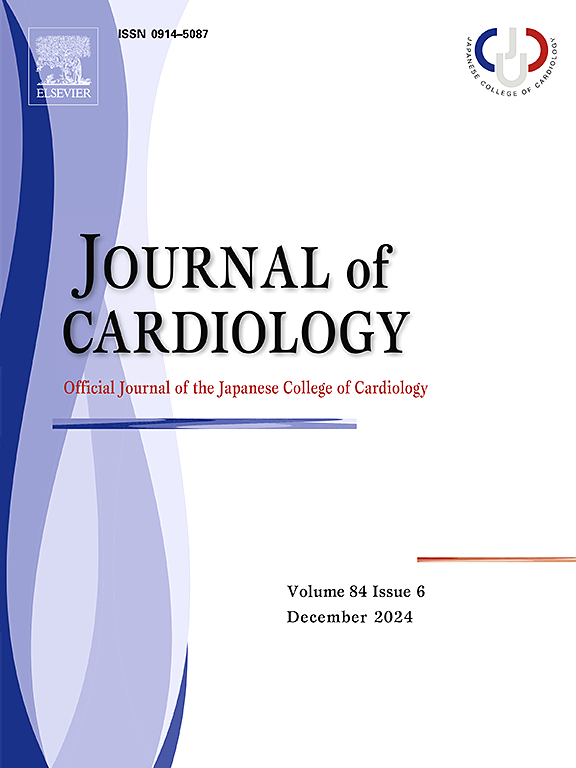心血管疾病患者认知能力下降与心血管康复预后的关系
IF 2.5
3区 医学
Q2 CARDIAC & CARDIOVASCULAR SYSTEMS
引用次数: 0
摘要
背景:心血管疾病(CVD)患者经常面临包括认知能力下降在内的各种合并症。认知能力下降是这些患者不良结局的风险标志。另一方面,心血管康复(CVR)改善了临床结果。然而,尚不确定CVR是否与CVD和认知能力下降患者的良好预后相关。因此,本研究旨在探讨CVR是否与CVD和认知能力下降患者的良好预后相关。方法:我们回顾了4232例CVD患者。出院时使用Mini-Cog评估认知功能,结果:在所有患者中,768例认知功能下降。即使在调整混杂因素后,认知能力下降组和非认知能力下降组之间的Δ6MWD也没有显著差异[估计平均差异:2.20 m;95 %置信区间(CI): -0.60-5.00 m]。此外,参加门诊CVR与较低的复合事件发生率相关,与认知能力下降无关[校正风险比(aHR): 0.589;95 认知能力下降组% CI: 0.552-0.627, aHR: 0.767;[95 % CI: 0.742-0.793]。在认知能力下降的基础上观察到相互作用(p = 0.011)。结论:不考虑认知能力下降,参加门诊CVR与运动耐量增加有关。此外,门诊CVR与两者的复合事件减少有关,在认知障碍患者中尤其明显。本文章由计算机程序翻译,如有差异,请以英文原文为准。
Associations of cognitive decline with outcomes of cardiovascular rehabilitation in patients with cardiovascular disease
Background
Patients with cardiovascular disease (CVD) are often contending with various comorbidities including cognitive decline. Cognitive decline is a risk marker for adverse outcomes in these patients. On the other hand, cardiovascular rehabilitation (CVR) improves clinical outcomes. However, it remains uncertain whether CVR is associated with favorable outcomes in patients with CVD and cognitive decline. Therefore, the present study aimed to investigate whether CVR is associated with favorable outcomes in patients with CVD and cognitive decline.
Methods
We reviewed 4232 patients admitted for CVD. Cognitive function was assessed using the Mini-Cog at hospital discharge, and a score of <3 was defined as cognitive decline. We measured the 6-min walking distance (6MWD) at discharge and 5 months after CVR prescription for participants in outpatient CVR. The primary outcome was change in exercise tolerance (Δ6MWD), and the secondary outcome was composite events (all-cause death and/or re-admission due to CVD). We compared Δ6MWD between patients with and without cognitive decline and examined the association between outpatient CVR participation and composite events.
Results
Of all patients, 768 had cognitive decline. There was no significant difference in Δ6MWD between the cognitive decline and non-cognitive decline groups, even after adjusting for confounders [estimated mean difference: 2.20 m; 95 % confidence interval (CI): −0.60–5.00 m]. Additionally, participation in outpatient CVR was associated with lower rate of composite events, regardless of cognitive decline [adjusted hazard ratio (aHR): 0.589; 95 % CI: 0.552–0.627 in the cognitive decline group and aHR: 0.767; 95 % CI: 0.742–0.793 in the non-cognitive decline group]. An interaction was observed based on the presence of cognitive decline (p = 0.011).
Conclusion
Regardless of cognitive decline, participation in outpatient CVR was associated with increased exercise tolerance. Furthermore, outpatient CVR was linked to reduced composite events in both, with particularly potent association in cognitively impaired patients.
求助全文
通过发布文献求助,成功后即可免费获取论文全文。
去求助
来源期刊

Journal of cardiology
CARDIAC & CARDIOVASCULAR SYSTEMS-
CiteScore
4.90
自引率
8.00%
发文量
202
审稿时长
29 days
期刊介绍:
The official journal of the Japanese College of Cardiology is an international, English language, peer-reviewed journal publishing the latest findings in cardiovascular medicine. Journal of Cardiology (JC) aims to publish the highest-quality material covering original basic and clinical research on all aspects of cardiovascular disease. Topics covered include ischemic heart disease, cardiomyopathy, valvular heart disease, vascular disease, hypertension, arrhythmia, congenital heart disease, pharmacological and non-pharmacological treatment, new diagnostic techniques, and cardiovascular imaging. JC also publishes a selection of review articles, clinical trials, short communications, and important messages and letters to the editor.
 求助内容:
求助内容: 应助结果提醒方式:
应助结果提醒方式:


